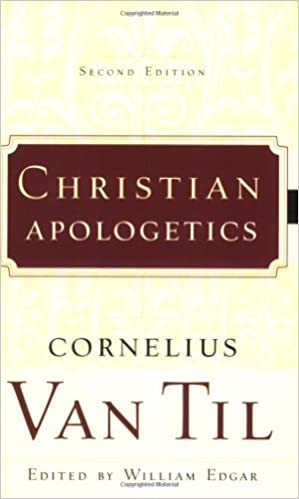A Brief Book Summary from Books At a Glance
by Steve West
About the Author
Cornelius Van Til (1895-1987) earned his PhD from Princeton University. He briefly taught apologetics at Princeton before moving to Westminster Theological Seminary, where he was a professor for decades. Van Til authored many books and is considered the founder of presuppositionalism.
Introduction
Christian Apologetics is an accessible work that presents a summary of the key issues in Van Til’s presuppositional approach to apologetics.
Table of Contents
Introduction: William Edgar
Chapter 1: The System of Christian Truth
Chapter 2: The Christian Philosophy of Life
Chapter 3: The Point of Contact
Chapter 4: The Problem of Method
Chapter 5: Authority and Reason
Summary
Chapter 1: The System of Christian Truth
“Apologetics is the vindication of the Christian philosophy of life against the various forms of the non-Christian philosophy of life.” Philosophical apologetics and the study of evidences for Christianity can never really be separated since Christian theism is a unit. Any discussion about the work of Christ must take into account a certain understanding of God. To use evidence to defend the historicity of the Christian religion depends upon a philosophy of history and fact, as well as the theism on which the Christian religion is based.
Apologetics and evidences have their own spheres, but they must be partners. Christianity provides both history and a philosophy of history. Apologetics helps coordinate and defend every specific topic in the theological encyclopedia. It is like a scout or messenger between military groups. The war we wage is both offensive and defensive. In the theological encyclopedia, apologetics is closer to systematic theology than to any other topic. Systematic theology takes the fruit from other biblical disciplines and brings the parts into a coherent whole. Its major topics are theology, anthropology, Christology, soteriology, ecclesiology, and eschatology.
The nature of God is fundamental for theology, as it is for apologetics. God is independent and immutable. God knows himself perfectly, exhaustively, and analytically. God knows every fact because his knowledge of the fact precedes its coming into existence through his will. He is absolute and self-contained. This one God is triune, and the unity and diversity in his nature are co-equal and co-ultimate. The Christian doctrine of the Trinity provides a unique philosophy.
In Christian metaphysics, the most basic difference in being is the difference between the eternal being of God and the derivative, created being of everything else that exists. In epistemology, God’s knowledge is self-contained but all human knowledge is derivative. Truth does not stand as an abstract standard over God. We know truth to the extent that our thinking corresponds to the reality of God and his knowledge. Facts and truth can be known in proper relationship by human beings. For ethics, God is the final determiner of what comes to pass. Human beings are to be obedient to his revealed will. Non-Christians see their own will as autonomous and ultimate, but everything is submitted to the will of God. Without the ultimacy of God there are no moral absolutes or distinctions.
Christianity must set forth and defend the fullness of who God really is; trying to prove a generic theism is not sufficient. Human beings are created in the image of God. We are similar to God, but will always be a created image. God created mankind to perform tasks on his behalf, representing him in the world. Adam and Eve fell into sin by rejecting the wisdom and word of God. They tried to find truth and meaning on their own. Roman Catholic theology and apologetics operate with a hybrid view, mingling some biblical elements with philosophy and human autonomy. Jesus Christ is fully God and fully man and Christ fulfills the offices of prophet, priest, and king. There is an organic relationship between these offices. There is also an organic relationship in soteriology between what Christ did for us and what he does in us. The Spirit applies the work of Christ to us. The church consists of the whole number of the elect. In the end, God will create a new heaven and new earth, which is the home of righteousness. . . .
[To continue reading this summary, please see below....]The remainder of this article is premium content. Become a member to continue reading.
Already have an account? Sign In
Buy the books

CHRISTIAN APOLOGETICS, by Cornelius Van Til